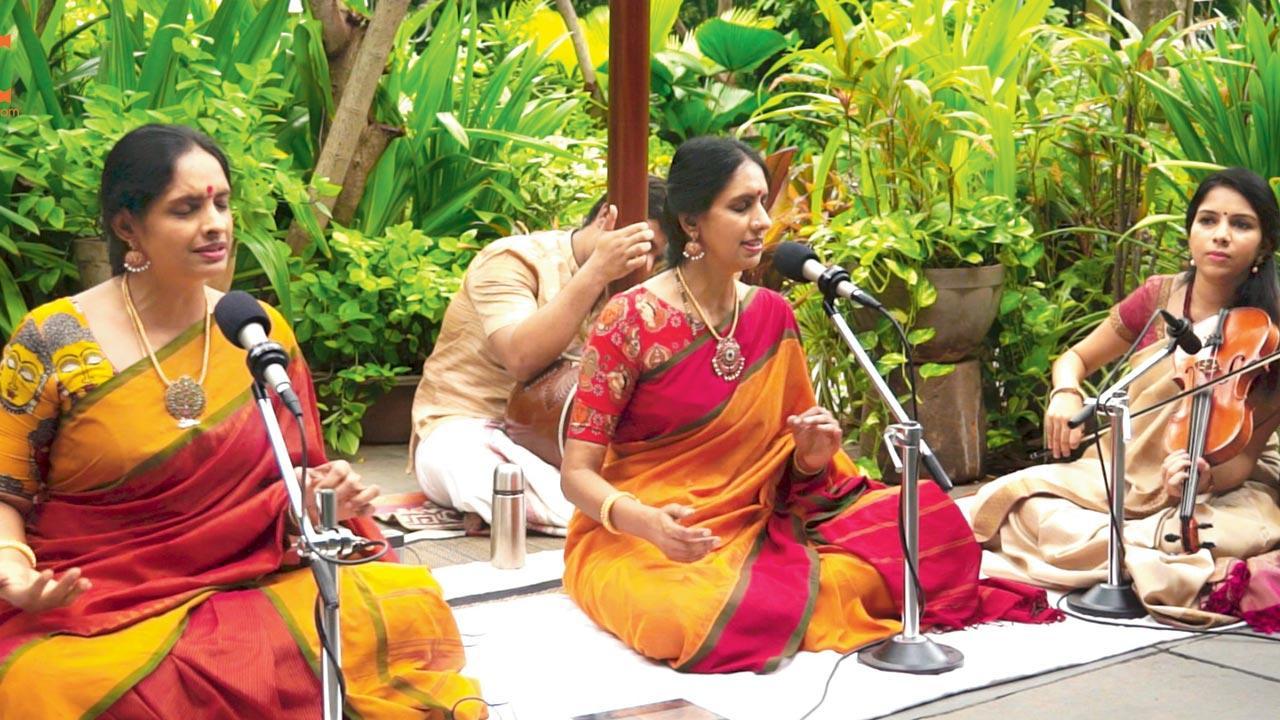With the pandemic taking away live audiences, and the intimate give and take of in-person lessons, purists and maestros have had to ask how they'll let the digital game help without destroying shastriya sangeet's soul

For voncerts.com, musicians Ranjani and Gayatri put together roof garden concerts where music blossomed among plants, creating the meditative setting of a puja room
The recent spike in COVID-19 cases and the resultant lockdowns and regulations across the country has brought on a new cycle of worry, fear and hopelessness. At this time, music provides not only the necessary balm of comfort, but also a vital sense of community and strength. Singer-songwriter Bindu Subramaniam, who along with violinist brother Ambi runs the Subramaniam Academy of Performing Arts (SaPa), speaks of its crucial contributions to social and emotional learning and development.
ADVERTISEMENT
“It is not just music for the sake of art, but it is also really important for mental health, for 21st century skills, to help build a sense of community, confidence, and critical thinking in children,” she says.
Flautist Ronu Majumdar, who has performed for SaPa and LiveDaily, feels it’s challenging to bring energy into a performance without a live audience
The organisation has been instrumental in introducing music education in schools, and has in the past one year collaborated with artistes like Usha Uthup, Shantanu Moitra and Ronu Majumdar to offer pre-recorded courses, live sessions and masterclasses to students of different age groups. “Initially, the challenge was to get used to the digital format and to convince the senior artistes, who have never done this kind of digital recordings on their own, that this was going to work,” shares violinist-composer L Subramaniam and renowned playback singer Kavita Krishnamurti, who founded the organisation in 2007.
Flautist Majumdar, who has performed for SaPa and LiveDaily, values the new audiences he has been able to reach through the new medium, but speaks of the challenge of bringing energy into a performance. Technology has been the other great barrier, and in this, the younger generation has been of vital help. “I am his flute guru, but he is my technology guru,” says Majumdar of son Hrishikesh. SaPa’s versatile platform has also allowed artistes like Shantanu Moitra to offer workshops on scoring films, something he believes has for long been left out of serious music conversations.
Pandit Ajoy Chakrabarty’s Shrutinandan was one of the first organisations to host online classes, with two studios and a dedicated team of sound engineers, recordists and video editors
Others like vocalist Sudha Ragunathan saw in the slowing down of life, an opportunity to tap into other interests. Apart from performing in virtual concerts organised by platforms like MadRasana—ticketed events which generated some revenue in a year with no high-paying concerts or government support—she launched a talk show titled Expressions Espresso with celebrity guests, and also found a way to unite her interests in cooking and singing in Sooda’s Kitchen, a show themed around similar-sounding food and ragas. “It was not simply to connect, it also takes people’s minds off the pandemic,” she notes of these ventures.
But going digital has brought the importance of production into focus. Artistes have had to quickly learn how to enhance visual and audio qualities of their recordings to make sure that they stand out from the daily sludge of internet content.
Carnatic vocalist Sudha Ragunathan’s Expressions Espresso hosted conversations and music sessions with artistes from the community
Ranjani and Gayatri, Carnatic vocal and violin duo, speak of the importance of maintaining the purity of sound. “In a live dynamic, if your delivery is not perfect, it might be missed, but when you record, the lack of perfection will be noticed. When you record something, it should translate the same emotions as when you perform live. We have learnt to sing with greater accuracy,” they share. While admitting that they miss the buzz and momentum of live shows, the sisters who have been putting up monthly shows on voncerts.com, say that the intimate setting produced by the absence of crowds has also created meditative spaces, allowing them to sing for themselves, even while connecting to a global listener base.
For the duo, however, online classes, especially ones which promise to teach ragas in a session are lucrative opportunities doing little in terms of sharing the art with the student.
Kavita Krishnamurti and L Subramaniam
Shivani Mirajkar, a young musician who launched her own academy, Sarang, in August, also draws attention to how some of these new organisations offering quick lessons exploit their trainers, sometimes not paying them at all. Mirajkar, however, speaks highly of her association with music learning platform VoxGuru, pointing to the rise in its enrolments since the lockdown last year.
For most traditional musicians, however, even those who have grown accustomed to teaching through the internet, online classes are only an inadequate substitute for the real thing. “We learn and imbibe a lot by sitting in front of our gurus. Technology has not advanced enough to make this possible in real time,” observe Ranjani and Gayatri, who believe that online classes alone cannot complete the knowledge dissemination in classical art forms.
Ajoy Chakrabarty, who was one of the first classical musicians to start live streaming classes in the country 11 years ago, through his platform Sudarshan Music, also agrees that eye contact with and close observation of the teacher’s body language are fundamental to learning music. His virtual classes are a part of his music academy Shrutinandan’s programme.
An issue both Ragunathan and Chakrabarty highlight is the plight of sub-rhythm artistes. “They survive on live concerts by accompanying the main artistes,” notes Chakrabarty, as both speak of extreme financial strain, resultant suicides and the initiatives undertaken in the past year, to help raise funds for them.
 Subscribe today by clicking the link and stay updated with the latest news!" Click here!
Subscribe today by clicking the link and stay updated with the latest news!" Click here!






